
"You suggested that the president sometimes communicates his wishes indirectly," Amash said, adding: "Can you explain how he does this?"
Cohen proceeded to explain that Trump rarely issues direct orders. So when Cohen lied to Congress, for instance, he was simply toeing the implied line Trump had set. It was hardly a game-changing moment in the hearing, but it was a clear and arresting departure. A Republican congressman seemed genuinely concerned about the accusations being made against a Republican president, and he was trying to further everyone's understanding of them.
We now know that Amash is much more than concerned; he's on the impeachment train. Amash this weekend became the first congressional Republican to call for Trump's impeachment, citing the findings of special counsel Robert Mueller's report on Russian interference in the 2016 presidential election.
That decision is significant enough, but what would be more significant is if Amash did what he has been subtly threatening to do: run for president under the Libertarian Party banner.
The libertarian-leaning tea party congressman said in January that the idea was "more on my radar now because everybody keeps asking about it." He told the Lions of Liberty podcast, "I just think it's important that we offer some alternative."
And Amash's motivations would go further than just Trump. He has decried the "two-party duopoly" in American politics - a pregnant statement from a man who ran for and serves in office as a Republican - and he has criticized his own tea-party wing of the party for selling out its principles.
"It turns out a lot of them were not in favor of limiting the size of government, they were just opposed to the president at the time," said Amash, who helped found the tea party-aligned House Freedom Caucus. "The tea party is largely gone. It was replaced with nationalism and protectionism and the general philosophy of the party now under Trump."
Amash has also departed from his party on some big issues, including Trump's border wall national emergency, his travel ban and even Trump's nomination of Brett M. Kavanaugh to the Supreme Court.
It's highly unlikely, of course, that Amash would be able to win the presidency; the highest share the Libertarian Party has ever received in a presidential election is the 3 percent that Gary Johnson got in 2016. But the party that year had ballot access in all 50 states.
Assuming it gets that again, Amash would have a real chance to expand upon Johnson's vote share. And whatever you thought of Johnson's policies, he was not that compelling a candidate; Amash, by contrast, is widely regarded as a smart and principled lawmaker. It's not difficult to see him doing better than Johnson. As with Howard Schultz, the question would be whether Amash would get many votes and whom they might otherwise have gone to - Trump or his Democratic challenger. But Amash is a slightly different case. You'll note that his state was one of the surprise states that Trump carried by less than 1 percentage point on the way to his 2016 victory.
It's also a state that has not shared in the broader country's economic gains. A January poll showed Trump with a 37.5 percent approval rating and trailing several Democrats in the state by as much as double digits. Trump was also disapproved by 17 percent of Republicans - about double where that rate has been in national polling.
There is evidence that home states tend to be better for third-party candidates. New Mexico, where Johnson served as a Republican governor, gave him 9 percent in 2016, while Utah gave Evan McMullin 21 percent. Texas was one of Ross Perot's better states when he ran in 1992 and 1996, as was Minnesota when Sen. Eugene McCarthy (D-Minn.) waged a quixotic 1976 independent bid. By contrast, 1980 independent candidate John Anderson, who like Amash served as a Republican congressman, did only slightly better in his home state of Illinois as he did nationwide.
Even if Amash didn't take much of the vote nationwide, if he overperformed in his home state, he could be depriving Trump of its 16 electoral votes, which would be a significant strike against Trump winning reelection. And it's not difficult to see Amash's more tea-party-oriented politics appealing to the limited number of disaffected Republicans in other states as well. Trump has pretty unified support in today's GOP, but there are also signs that it's somewhat soft.
And given that as much as 56 percent of the country says they won't vote for Trump, Trump cannot afford to have many would-be Republican voters peeled off by a third-party candidate.
Trump this weekend took to Twitter to call Amash a "loser" - perhaps giving him a preview of what life would be like if he entered the presidential campaign. Amash has to know he would be in for some hard times if he ran, given that Republicans would instantly view him as a potential spoiler. And his comments thus far do not suggest someone who is strongly leaning toward running.
But he's also the kind of politician who seems willing to put himself on the line to make a point about principles. And 2020 is shaping up as a pretty good chance to make that point.
Sign up for the daily JWR update. It's free. Just click here.
(COMMENT, BELOW)


 Contact The Editor
Contact The Editor
 Articles By This Author
Articles By This Author